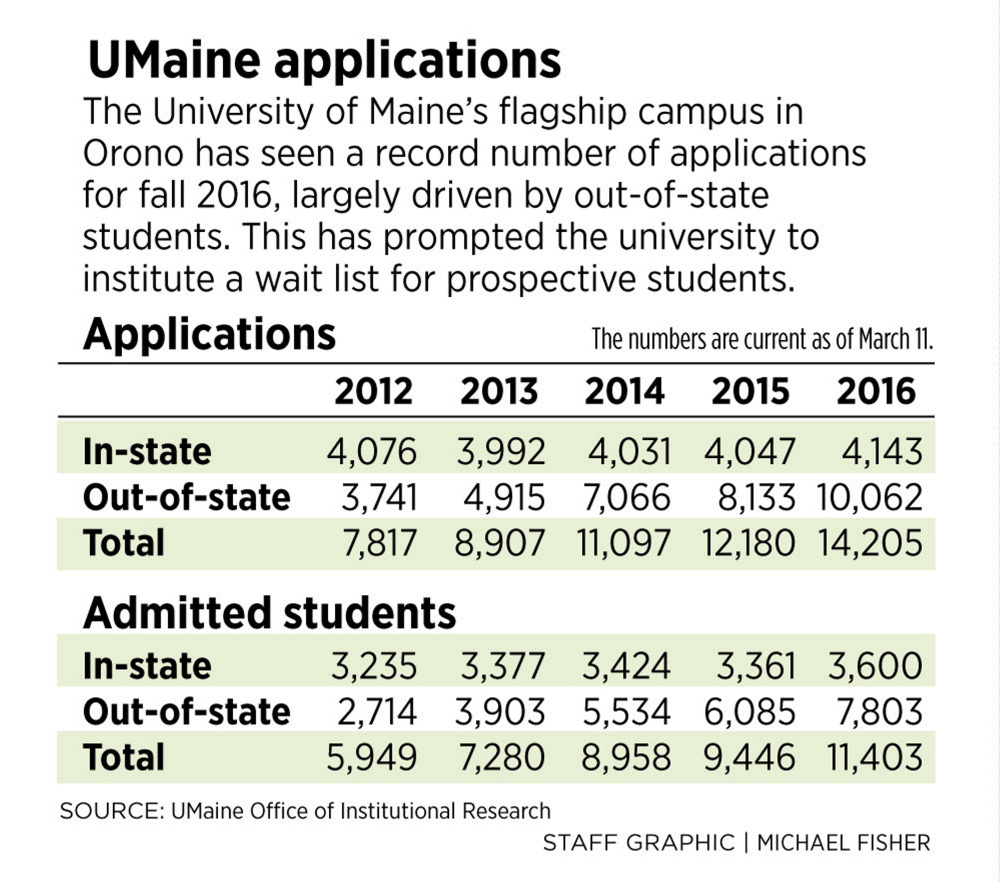Aggressive marketing and a novel tuition incentive to attract out-of-state students are paying off for the University of Maine, where a record number of qualified applicants has prompted admissions officials to start a wait list for the first time in recent history.
The university in Orono has 14,205 qualified applicants for 2,150 seats in the incoming class of 2020, officials announced Thursday. That’s 2,025 more first-time applicants, a 17 percent increase, over this time last year.
The university plans to notify most applicants who have yet to be accepted that they have the option to be wait-listed for future consideration.
“The interest in UMaine among prospective students is truly exciting and speaks to the value of the University of Maine and Maine itself,” university President Susan Hunter said. “Our commitment to providing a high-quality education at an affordable price resonates with students and families.”
The university has had wait lists in the past for specific academic programs. This year, the large number of applications so early in the student recruitment season prompted a university-wide wait list.
Of the 14,205 applicants, UMaine sent acceptance letters to 11,403, who are referred to at this point as “admitted students,” even though it’s unknown how many will select UMaine and enroll in the fall. Those students have a May 1 deadline to put down deposits, allowing the university to get a clearer picture of how many intend to come to Orono.
Most students apply to multiple colleges, and many get multiple offers, so all colleges admit far more students than they expect to enroll.
UMaine officials said that admitted students on the wait list will learn whether they have been accepted by May 6. Those who don’t get into UMaine, the flagship campus of the state’s university system, will be guaranteed admission at the campuses in Augusta, Fort Kent, Machias and Presque Isle, and the University of Southern Maine.
‘FLAGSHIP MATCH’ SPURRING INTEREST
One reason for the surge in interest is the school’s new “flagship match” program, which allows students from six targeted Northeast states to pay the same tuition they would pay at the flagship campuses in their home states.
That means, for example, that a Pennsylvania student would pay $17,515 a year to attend UMaine – the in-state cost at Penn State University. That’s far more than UMaine’s in-state tuition of $10,610, but far less than UMaine’s out-of-state tuition of $28,880. The school reaps the financial benefit of gaining a student who is paying substantially more than the in-state rate, while the students are enticed to enroll by paying less than the out-of-state tuition.
The flagship match program is available to students from New Hampshire, Massachusetts, Connecticut, Vermont, New Jersey and Pennsylvania, all of which have higher in-state tuition than Maine.
While in-state applications have remained steady, rising slightly from 4,047 last year to 4,134 this year, long-term efforts to recruit out-of-state students have borne fruit for UMaine, with out-of-state applications rising from 3,741 in 2012 to 10,062 this year. Of the 11,403 students who were sent acceptance letters, 3,600 are in-state students and 7,803 are from out of state.
In addition to the financial incentives, UMaine launched a new marketing campaign and strategic recruitment efforts last fall, including greater interaction with high schools throughout Maine and New England.
Inquiries from prospective students for the fall of 2018 have doubled over last year at this time, from 17,000 to 36,000, said Joel Wincowski, vice president of enrollment management.
With so many applications, the university is in a position to be more selective about its admissions, the release said.
“The strong interest in UMaine has resulted in a highly competitive applicant pool,” said Jeffrey Hecker, executive vice president and provost who oversees enrollment management. “We’re attracting students from throughout New England who are interested in the educational experience associated with a nationally ranked research university. Our location in one of the most attractive states in the country and our competitive tuition are also draws for out-of-state students.”
Hecker acknowledged that creating and announcing a wait list is part of the marketing campaign, but he said the university is genuinely concerned about making sure it enrolls the maximum number of seriously interested students, which is estimated to be between 2,175 and 2,800 of the 14,205 applicants.
A LARGER INCOMING CLASS
A projected incoming class of 2,150 students would be about 100 students larger than last year, Hecker said, an increase that would allow enrollment to grow without diminishing the quality of education.
University officials, including the trustees, say they have tried to freeze tuition despite budget shortfalls primarily so they can attract in-state students and keep college affordable.
On Monday, the UMaine System Board of Trustees voted for a sixth year without a tuition increase for Maine residents, a sharp contrast to rising costs at other public four-year universities in recent years. In-state tuition and fees, and room and board totals $23,386 at UMaine, while out-of-state students pay $41,656.
The tuition freeze means that, in inflation-adjusted dollars, Maine has actually lowered the cost of in-state tuition by 2 percent over the last five years, compared with an average 13 percent increase at public four-year schools nationwide, according to the College Board.
With a current graduate and undergraduate enrollment of 10,922, UMaine is the state’s only public research university, offering doctoral degrees in 35 fields, representing the humanities, sciences, engineering and education; master’s degrees in nearly 70 disciplines; and 90 undergraduate majors and academic programs.
Applicants can accept spots on UMaine’s wait list by emailing umainewaitlist@maine.edu or calling 581-1561. More information about UMaine’s wait list is available at go.umaine.edu/waitlist.
Send questions/comments to the editors.






Comments are no longer available on this story